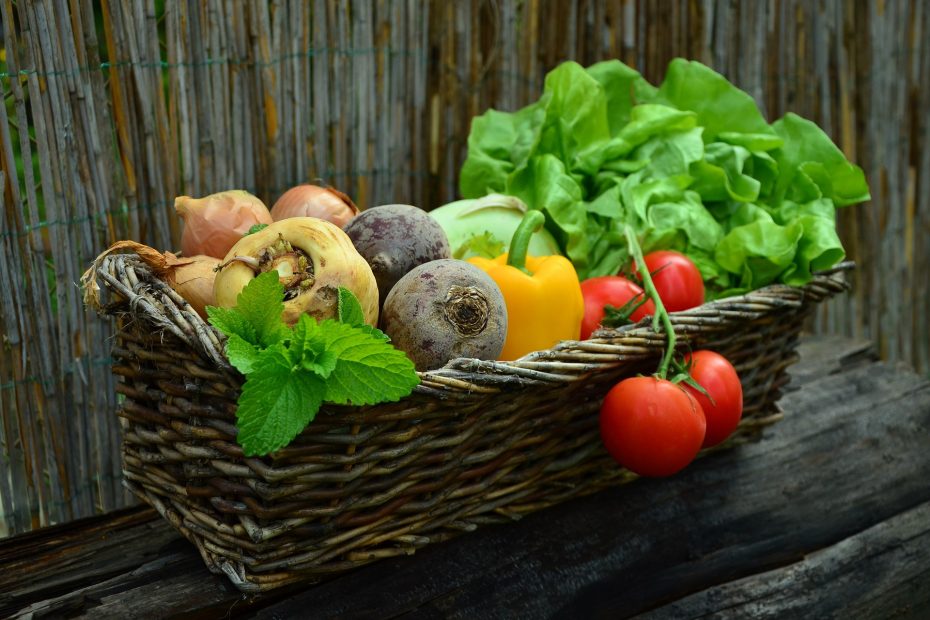After all the indulgences over the festive season, are you wanting to kickstart your year with some healthy food choices? With all the hype around plant based foods during 2021, in this article we will discuss 15 high protein vegetables you can add to your diet that maybe you were not aware of.
Protein is a key component of a healthy diet, and while you can certainly get protein from meats, cheeses, and other food items, some of the best protein sources are vegetables. In addition to being easier on your wallet, these veggies (many of which can actually be grown at home, if you’re feeling ambitious) tend to be loaded with other nutrients, which some of those other foods may lack.
Given the importance of protein, we decided to profile 14 of the most protein-dense vegetables around:
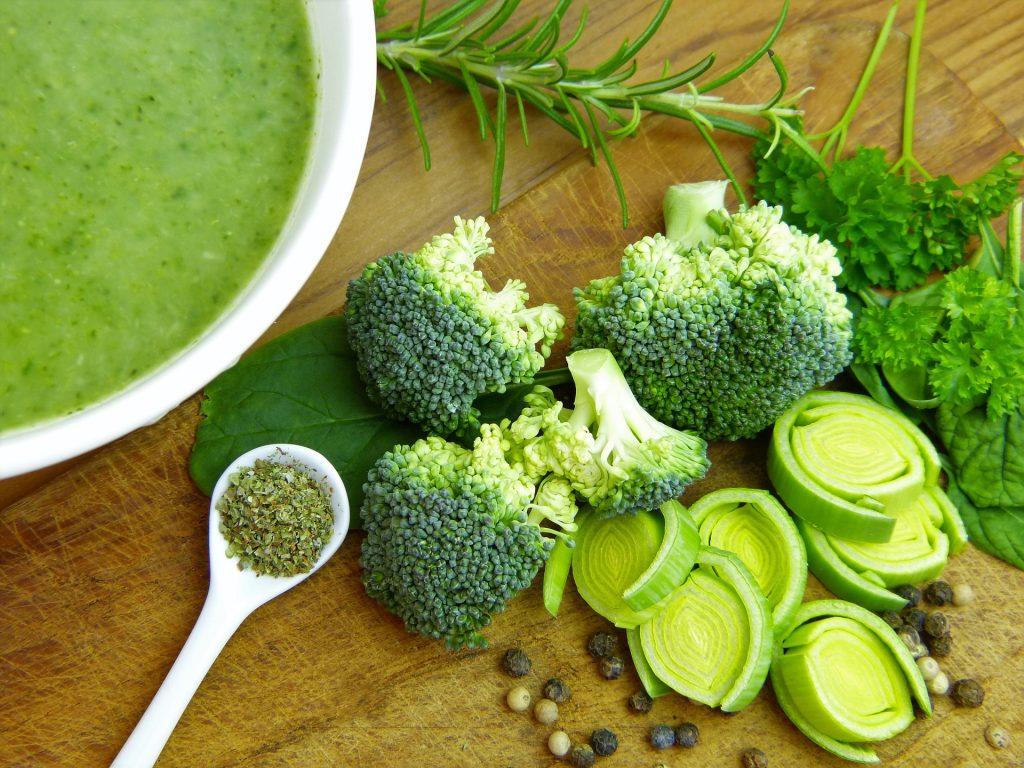
1. Broccoli
Protein, per 1 bunch (cooked): 16.7 g
Broccoli is one of the most nutritious veggies you can eat. Broccoli is a great vegetable choice because it’s low in carbohydrates, high in fibre, and a significant source of vitamin C and vitamin K. The top broccoli benefits are: 1. Broccoli boosts your immune system 2. It helps protect your heart 3. Broccoli can boost your mood 4. It is good for your liver 5. Broccoli protects your joints
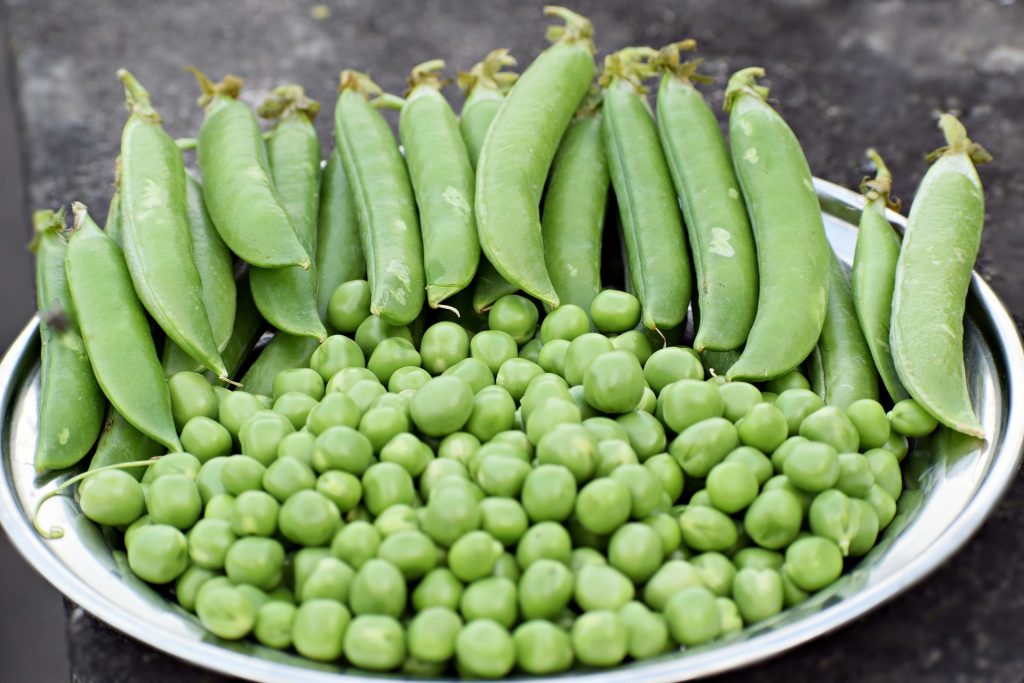
2. Green Peas
Protein, per 1 cup (frozen then cooked): 8.24 g
In addition to being packed with protein, green peas are easy to add to just about any dish. This meal pairs the tiny, colourful veggies with half a dozen eggs and bacon, which really takes the protein content to the next level. If you’re on a quest to get more protein, keep a package of frozen peas in your freezer and thaw them whenever you need a little boost.

3. Russet Potatoes
Protein/large potato with skin (baked): 7.86 g
we do not need an excuse to eat a baked potato, but if we did, we’d call out this tuber’s stellar protein content. These loaded Russets are great solo, but also go well with a lean piece of chicken, steak, or fish. And for the record, Russet potatoes are a good source of vitamins C and B6, which helps keep your immune system in tip-top shape.
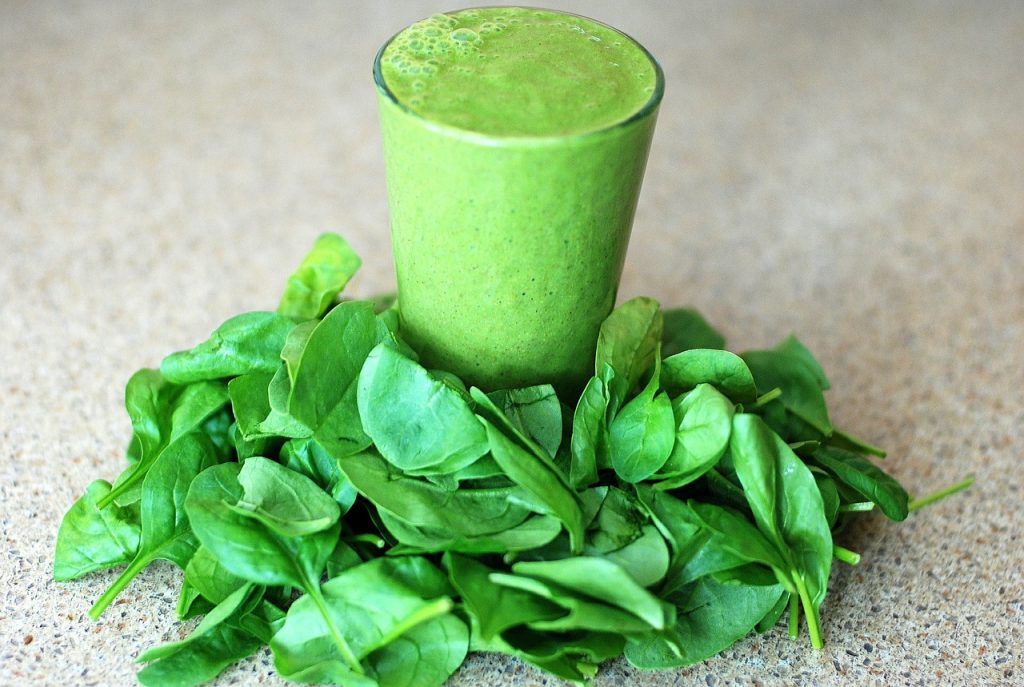
4. Spinach
Protein, per 1 cup (cooked): 5.35 g
“Nutrient-packed and boasting powerful antioxidant protection, spinach contains a range of phytonutrients like carotenoids, as well as flavonoids, and is an excellent source of other antioxidant nutrients including vitamin C, vitamin E, beta-carotene, manganese, zinc, and selenium, It is excellent for boosting bone health with vitamin K, magnesium, manganese, and calcium, and is also a fabulous source of fibre.
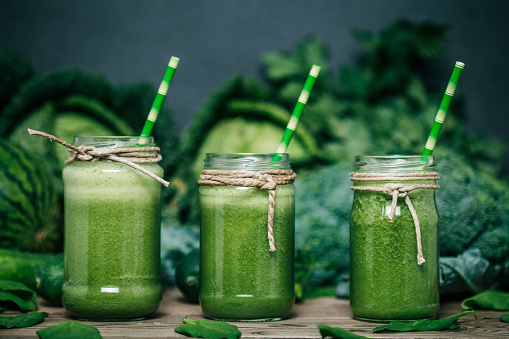
5. Collard Greens
Protein, per 1 cup (cooked): 5.15 g
If you’d rather drink your greens, give this nutritious smoothie a try. It’s packed with an impressive two cups of collards, and is also made with fresh lime juice, frozen mango, and green grapes. So drink up! and in case you’re wondering, collard greens are lauded for more than their protein content. They are vegetables that have large green leaves and tough stems like kale or cabbage. According to a 2018 study, individuals who have a high intake of collards and other cruciferous vegetables have a reduced risk of developing certain types of cancers, including prostate, breast, ovarian, lung, bladder, and colon cancer.
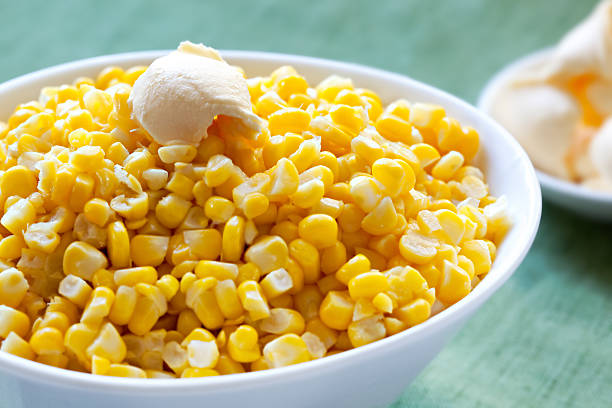
6. Sweet Yellow Corn
Protein, per 1 cup (boiled): 5.08 g
Use fresh or frozen corn here to make this Thai-inspired noodle dish that also includes rice noodles and tender tofu cubes in a rich coconut curry sauce. Aside from getting a protein boost, your body will thank you because sweet yellow corn is a good source of vitamin B6 and potassium, which is important for blood pressure control and may improve heart health.

7. Artichoke Hearts
Protein, per 1 cup (boiled): 4.86 g
Use artichoke hearts to make a quiche, which means you will be getting a nice dose of protein each time you whip up this savoury quiche. Artichokes, in general, are also particularly good sources of folate and antioxidants, and the veggies may help promote friendly gut bacteria. This, in turn, may reduce your risk of certain bowel cancers, and alleviate constipation and diarrhoea. What’s more? This brunch classic also features eggs (obviously) and bacon, which means you’ll be ingesting even more protein.
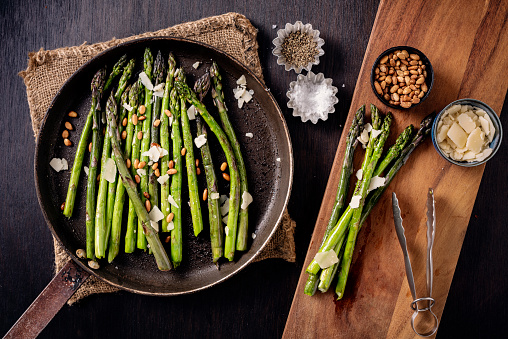
8. Asparagus
Protein, per 1 cup (boiled): 4.32 g
Serve this asparagus-centric side with your next dinner, be it a piece of grilled fish or a roast chicken. Here, fresh asparagus spears are dressed with a flaxseed walnut crumble. In addition to being packed with protein, this nutritious dish boasts tons of omega-3s, courtesy of the flaxseeds and walnuts. Just a half cup of cooked asparagus provides a whopping 57% of the recommended daily intake for vitamin K—a critical nutrient for bone health that tends to get overlooked. That half cup serving also provides 34% of the RDI for folate, a nutrient which is essential for cell growth and DNA formation. It also contains inulin, a prebiotic fibre that feeds healthy gut bacteria and positively impacts gut health
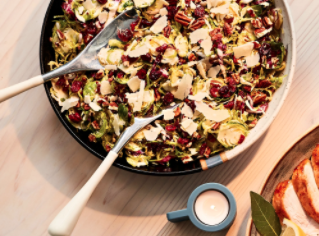
9. Brussel Sprouts
Protein, per 1 cup (cooked): 3.98 g
Brussels sprouts although not liked by some are one of the most potent cancer fighters out there. That’s because they play a major role in the body’s three systems that are involved with cancer and provide nutrients that support them—the body’s antioxidant system, detoxification system, and the inflammatory/anti-inflammatory system, Brussels sprouts are a great source of heart protective folate and fibre. Try this sprouts-packed salad, which also features toasted pecans, dried cranberries, and shaved provolone cheese.
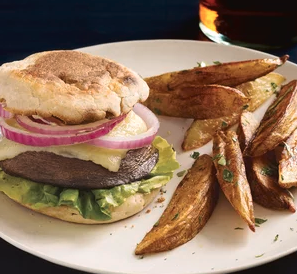
10. Portobello Mushrooms
Protein, per 1 cup (grilled): 3.97 g
Next burger night, consider swapping out the meat for some grilled Portobello mushrooms instead. These hearty shrooms pack plenty of protein, which is part of the reason why this vegetarian meal, which also includes a healthier take on fries in the form of roasted Russet potatoes, keeps you feeling full long after you’ve finished. A great source of fibre and immune-boosting vitamin D, zinc and selenium, Portobello mushrooms are the ultimate MLV (Meat Lover’s Vegetable) because of their thick and juicy meaty texture and high protein content. Plus, Portobellos are packed with potent phytonutrients like L-ergothioneine, which prevents inflammation.
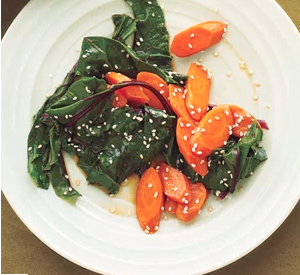
11. Beet Greens
Protein, per 1 cup (cooked): 3.70 g
Next time you’re searching for a versatile side dish, remember this healthy number that’s filled with beet greens. In addition to being a great source of protein, beet greens are also loaded with tons of important nutrients, including Vitamin C, phosphorus, and zinc. In fact, beet greens are so nutrient-dense that they’ve been shown to reduce liver damage in mice. As if that was not enough, this side also includes nutritionally dense carrots and crunchy sesame seeds.
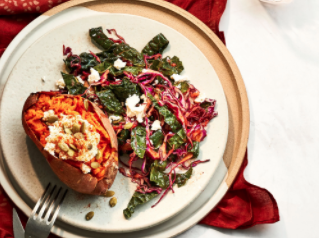
12. Sweet Potato
Protein/large potato with skin (baked): 3.62 g
Though not as high in protein as Russet potatoes, sweet potatoes still pack an impressive protein punch. Enjoy them as a side or solo, but remember to eat the skin if you want to soak up all that protein. This recipe also includes feta cheese, which is another solid source of the muscle-building nutrient. They’re a rich source of vitamin B6, which is also important to create serotonin. Packed with disease-preventing phytonutrients, sweet potatoes are an excellent source of carotenoids, which fight everything from the negative consequences that come with ageing to almost all types of disease.
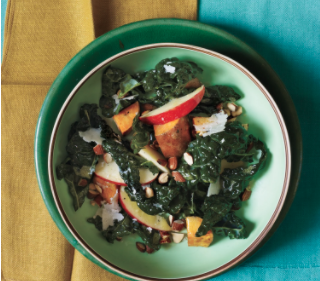
13. Kale
Protein, per 1 cup (cooked): 3.47 g
Kale and sweet potato join forces in this salad which, despite being meat-free, is filled with protein. Eat it alongside a piece of grilled chicken or fish to add even more protein to your eating regimen. Kale is an ultimate nutrition all-star. It’s packed with anti-inflammatory and antioxidant nutrients, and has been linked to a reduction in oxidative stress and the health problems related to it, like cancer, cataracts, atherosclerosis, and chronic obstructive pulmonary disease. Kale is an excellent source of bone-healthy vitamin K, as well as vitamins A and C, and the veggie is a very good source of fibre, potassium, B6, and calcium.
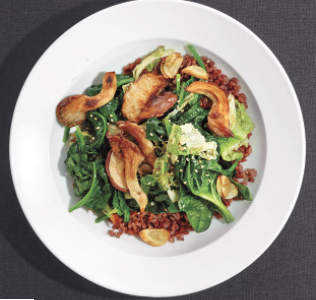
14. Shiitake Mushrooms
Protein, per 1 cup (stir-fried): 3.35 g
In addition to being a great source of fibre and B vitamins, shiitake mushrooms are superheroes for the immune system. They are packed with anti-inflammatory compounds that seem to be largely responsible for helping to strengthen the body’s defences. Aside from boasting multiple nutrition benefits, shiitake mushrooms are impressively versatile and can be added to a wide variety of dishes. Here, the healthy fungi are joined by red rice, cabbage, and spinach for a flavourful stir-fry that’s destined to be a crowd-pleaser.
Hopefully the humble and underestimated vegetable will be seen in a different light after reading this article. An added bonus will to be to grow your own. These types of vegetables do not require a huge amount of space and it will reward you many times over. Contact Balanced Healing If you require more personalised nutritional advice and meal plans.
Reference
Website: https://www.realsimple.com/health/nutrition-diet/healthy-eating/high-protein-vegetables-recipes
